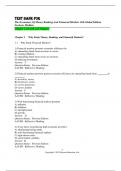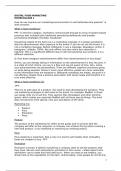Tentamen (uitwerkingen)
Test Bank for The Economics Of Money Banking And Financial Markets 13th Global Edition Frederic Mishkin
- Vak
- Instelling
- Boek
Test Bank for The Economics Of Money Banking And Financial Markets 13th Global Edition Frederic Mishkin
[Meer zien]





